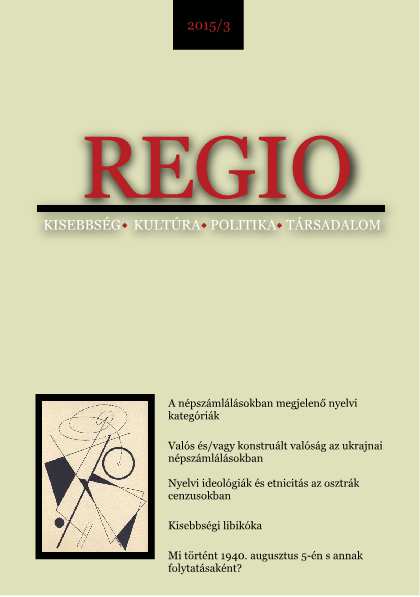
Határsértések: a tudomány és a politika határán
Orosz László: Tudomány és politika. Fritz Valjavec (1909–1960) a két világháború közötti magyar–német tudománypolitikai kapcsolatokban. Budapest, Ráció Kiadó, 2014.
More...We kindly inform you that, as long as the subject affiliation of our 300.000+ articles is in progress, you might get unsufficient or no results on your third level or second level search. In this case, please broaden your search criteria.

Orosz László: Tudomány és politika. Fritz Valjavec (1909–1960) a két világháború közötti magyar–német tudománypolitikai kapcsolatokban. Budapest, Ráció Kiadó, 2014.
More...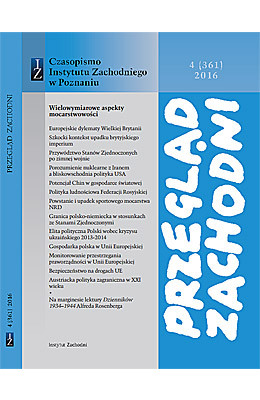
This article aims to analyze the relation between British imperialism and the Scottish question. In the first place, the role played by Scots as a nation in the creation of the empire is described, including different frameworks, i.e. internal colonialism. Secondly, the hypothesis of the indissoluble connection of institutions of the British Empire and the United Kingdom (UK) is verified. The collapse of the British Empire had to undermine the sense of the existence of the UK. In the opinion of the author of this article a significant relation between the two phenomena can be observed, although he stipulates that it had a non-obvious form, and the occurrence of the consequences was not a "historic necessity", but had been reinforced by a number of other reasons, of perhaps greater importance, as e.g. the failure of the Thatcher government, the weakness of the unionist parties in Scotland and the social and economic transformations. The Empire was perhaps the most apparent symbol of the unity of the UK and a focus of the British loyalty. And most importantly - the Empire strengthened the sense of the Scottish identity, allowing to assign to it the attribute uniqueness and introducing it into a modern frame. It is worth mentioning that the causal description may not be the right perspective here, thinking in terms of the system would be more valuable - every relationship and every variable, which is commonly referred to as being an effect or a cause, in fact, is both: cause and effect, as the relations are never one-way.
More...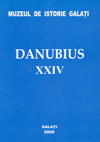
The coup d’état from February 1866 is the first event of this kind in the modern and contemporary history of Romania. Subsequently, similar scenarios occurred in 1930, 1940, 1944, 1947 and 1989, of course, with different purposes and different protagonists. But they can neither be compared, nor analysed from a similar perspective with the event from February 1866. The modern and contemporary “plotters” have presented their actions as “revolutions”, in accord with the will of the people, which represents an extreme position and a blameable historical fakery. On February 11, 1866, the planners of the coup d’état chased Alexandru Ioan I away for personal and group interests, being legitimated neither by the people, nor by the international conventions established by the Great Powers of those days. After 14 decades, even if the event could be thoroughly and honestly analysed, the explanations given by the historians generally don’t represent the result of a complete and non-partisan analysis. The article hereto embarks upon an analysis of the limits of the loyalty of politicians and responsible institutions, without laying the blame on anyone due to lack of proofs. Our contribution consists in presenting several essential aspects of the event: the irresponsibility of plotters who put the unified Romania – this centuries-old dream of the people – in danger, the lack of diplomatic and media aspects of the actions and, the most serious thing, the presentation of the “revolution” as a legitimate action performed in the name of the entire nation.
More...
This study examines the circumstances which lead to the purge of Aleksandar Ranković, the longtime person “Number one” in the State Security’s apparatus. The study also analyses the impact it had on the future events in the history of Yugoslavia. The political fall of Aleksandar Ranković coincided with the beginning of the process of redefining relations between the member-states of the Federation sparkling suspicions that the two events were closely interlinked. Moreover, Aleksandar Ranković was posthumously proclaimed Serbian nationalist. In this study, we also analyse what affairs during the Ranković’s ouster can be linked to his name; how much truth there is in the accusations of his involvement in the wire-tapping of the Yugoslav top level political leaders’ affair and what were his ambitions to become one of them. What implications did these events have on the wider scope of the state’s political actions?
More...

Gdy zwrócono się do mnie, bym omówił kwestię „aktualności Behemota”, od razu pomyślałem, że w tytule brak jednego słowa: „dzisiaj”. Szczególnie dzisiaj, gdy ponownie analizujemy reżim narodowosocjalistyczny – nie tylko w Niemczech, lecz na wszystkich kontynentach – warto zadać sobie pytanie, dlaczego Franz Neumann nie jest częściej cytowany w publikowanych obecnie książkach. To zrozumiałe w czasach, gdy ukazuje się tak wiele książek, że fundamentalne idee, od których zależy tak wiele badań i tekstów, nareszcie stają się częścią książek, bez przywoływania ich autorów. Długość jednego pokolenia – gdy mowa o ludziach – wynosi zapewne 25 lat, a przy małym przyroście naturalnym być może 30 lat, natomiast w działalności wydawniczej możemy mówić nawet o dziesięciu latach; w tym czasie pojawia się nowa generacja autorów, których książki mają nową formę i pisane są z nowego punktu widzenia. W tym sensie od wydania Behemota minęło kilka pokoleń.
More...
Wśród ksiąg pamięci, czyli wydawanych po wojnie publikacji upamiętniających unicestwione w wyniku Zagłady żydowskie społeczności Europy Środkowo-Wschodniej, tom poświęcony prawobrzeżnej części Warszawy zajmuje szczególne miejsce. Jest to jedyne spośród ponad pół tysiąca tego typu wydawnictw, które nie dotyczy ujmowanego jako całość konkretnego miasta (lub miasteczka), lecz zaledwie jednej dzielnicy, wydzielonej z większego organizmu miejskiego.
More...
Još od kraja 16. vijeka, obrazovani Bošnjaci, sa Hasanom Kafijom Pruščakom u pročelju, uočavajući spoljne manifestacije i znakove unutarnjeg, običajno-moralnog miniranja moći Osmanske države, prolazili su kroz iskustva kritičkog promišljanja društva, politike i države. Zavisno od svoje opće svjetonazorske orijentacije kao i od karaktera "užih disciplina" unutar kojih se iskazivalo njihovo duhovno stvaralaštvo (logika, dijalektika, retorika, dogmatika, ali i poezija, etika, politika ili historiografija, naprimjer) njihova je kritička misao poprimala različita utemeljenja, ogledala se oko raznovrsnih sadržaja i time određivala razinu apstraktnosti u svojim rezultatima kao i svoje ambicije u odnosu na fakticitet osmanske društvene i političke zbilje.
More...
This paper deals with political theory that Michael Psellos expresses in his programmatic work, the Chronographia, exploring it on its own merits and separating it from his alleged social and political “biases”. Psellos’ history is analyzed from several perspectives and on several narrative layers. The paper dwells on his views on the imperial ideal, as well as his opinions on participants in the political life of the empire (mainly imperial advisors and generals), from both horizontal (Constantinopleprovinces; center-periphery) and vertical (the masses and the aristocracy) perspective, reflecting upon his stance on what constitutes aristocracy. Finally, it reexamines Psellos’ “Constantinopolitan bias” by distinguishing his attitudes from his perspective, identities and alliances, and exploring in which ways exactly his metropolitan upbringing and education shaped his narrative.
More...
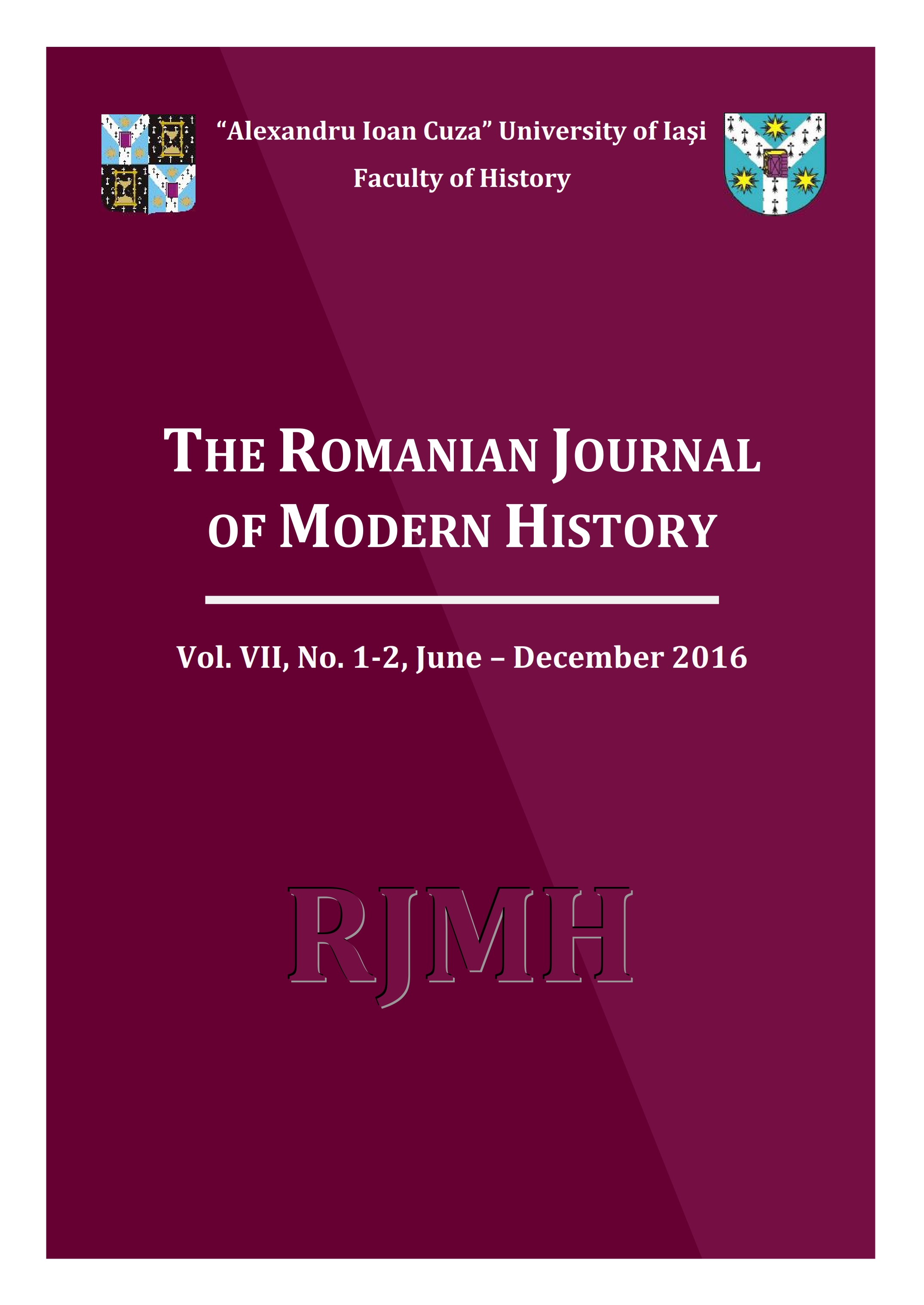
At the end of 1849 or at the beginning of the next year, Lascăr Catargiu was designated prefect of the Neamţ county. Catargiu was, at the time, less than thirty years old and he lacked significant administrative experience. His social position and family relations, and his participation at the events of the year 1848 were probably the main reasons of his designation as prefect. However, he managed to successfully fulfil his attributions. He took part in several enquiries concerning the activity of former county officials, and played a pivotal role in the reactivation of the local council of Târgu Neamţ and in the reconstruction of the school of Piatra (the district capital). On the other hand, despite his efforts, Catargiu could not manage to solve other problems, like the situation of the roads in the county. When he left office, he was praised by the superior authorities and he was officially received among the boyars (nobles) of the Moldavian Principality. His first experience as prefect is important for the understanding of his later career. The familiarization of the young boyar with the administrative practice and his success in office allowed him to aspire to positions of both greater power and prestige.
More...
The conservative government of 1891-1895 represents an issue that has aroused little attention and interest in the Romanian historiography, and when it did, the ideological reflex was not late to appear. With few exceptions, the common denominator of research conducted by Romanian historians upon this theme was always to construe an interpretative guideline, information brought „surprises” only through an ideological and informal leitmotif that somehow became „traditional”. Beyond the meanings of political history and the manner in which the conservative phenomenon was historiographically mirrored, so far, the contribution of some historians appears as having a tendency to order and make a complex reality more perceivable, in which the „political” doesn't express only through reform and development, but also through its main coordinate, which is power. Integrant and legitimate part of the fundamental themes of Romanian modern history, the conservatism approach in a gnoseological way, under its dual nature of ideology/doctrine and political party, has found in Romanian historiography a rather arid land. The selection we had in mind implies a rallying to the new methodological profile proper to the interpretation of the Romanian conservatism. Invariably, there are works that associate themselves to a predetermined trajectory of interpretation and which started from certain historiographical references, the information brought being attached to a purely ideological analysis. Therefore, the Romanian historiography could not escape the influences of Marxist vision, appeared with the prevailing of the communist ideology. The writings of that period offer a different picture of the events, according to the memoirist affinity for one party or another or the degree of personal involvement. If these were written in a subjective manner, the direction of historiography suffered the most from ideological pressures, the occurred interpretations distorting essential historical circumstances and subjecting history as a science, to an inappropriate treatment, with undesirable and important effects.
More...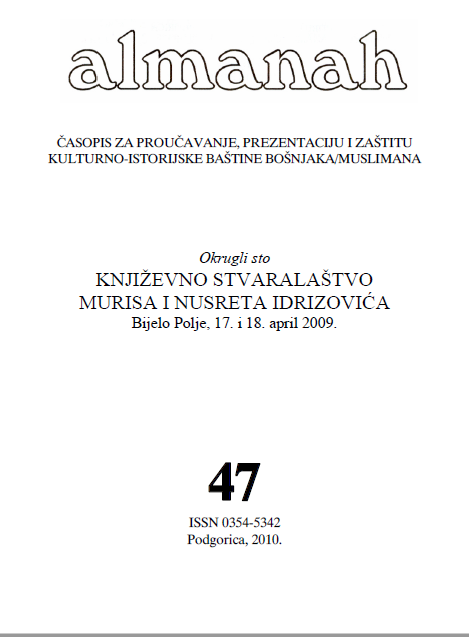
Roman Nusreta Idrizovića „Efendija u tajnom gradu“ je društvenog sadržaja. Njegova radnja i tematika odnose se na Sandžak, bolje kazano politički status Bošnjaka u Sandžaku. Društveno-politička pozicija ove nacionalne zajednice definira individualne životne situacije svakog pojedinca u svakom trenutku i aspektu. Roman „Efendija u tajnom gradu“ je izvanredna društvena slika stanja u Sandžaku nakon Drugog svjetskog rata. Kroz prizmu tog vremena predstavljena je skoro dvostoljetna historija ove nacionalne zajednice, kako u sinhronijskom tako i u dijahronijskom smislu. Iako je društveno stanje poslije Drugog svjetskog rata, promatrano kroz perspektivu vječnosti historije kao prostora ljudskog društvenog postojanja i djelovanja, samo jedan ograničen trenutak, u njegovom sadržaju prisutna je i kroz njega izražena cjelokupna historija ovog prostora preopterećenog brojnim političkim i drugim teškoćama. Roman elaborira jednu univerzalnu postavku po kojoj ekstatičnost vremena i vremena na jednom konkretnom primjeru pokazuju da se pojedini momenti vremena, odnosno momenti historije međusobno ne razlikuju suštinski, već samo fenomenoški.
More...
The traditions of modern local government in Poland date back to the 3rd May Constitution of 1791. Political defeat of the Republic ending with the third partition of Polish in 1795 prevented the further development of the Polish local government. Under the provisions of the authorities of the partitioning powers in the occupied territories of those powers the appropriate occupant principles of public administration were introduced.
More...
The Fourth Crusade, began with call of the Pope Innocentius III to conquer Muslim-controlled Jerusalem, turned on the Byzantine Empire deviating from the original purpose as a result of intervention of Venice Doge Enrico Dandolo. Latins captured the Constantinople on 13 April 1204 and founded a kingdom. After the fall of the Constantinople successor states (The Empire of Nicaea and The Despotate of Epirus), founded by the aristocracy of the Byzantine, engaged in the fight against Latins. The Empire of Nicaea which one of these two states put an end to Latin domination in Constantinople in 1261 after fifty-seven years of struggle. In this article, relations between the Latin Empire of Constantinople and the Empire of Nicaea will be discussed.
More...
Count István Széchenyi was one of the greatest personages in the Hungarian history. He was the foundater of the liberal-national programm, and one of the leaders of the Hungarian refom era 1825-1848. Through his example he showed that unwavering patriotism, endless energy and persistence in political, economical and social problems will be profitable, and it will have positive results in development of the country. With his moral qualities, wide ranging social and political thoughts he became an emergent and hardly reachable example for his age, and for the next generations as well. He was the foundator of the Hungarian Academy of Sciences, the builder of the bridge, which connected the city of Buda with the city of Pest, he developed the traffic, expecially the steamshipment, he controlled the Danube River at defile of Đerdap. He also wanted to establish the railroad of Hungary, and he wanted to improve Budapest, so that the city would become the economic and cultural center of the country. Count Széchenyi also started top-quality horse breeding, horse races and he also established the cassinos in Hungary.
More...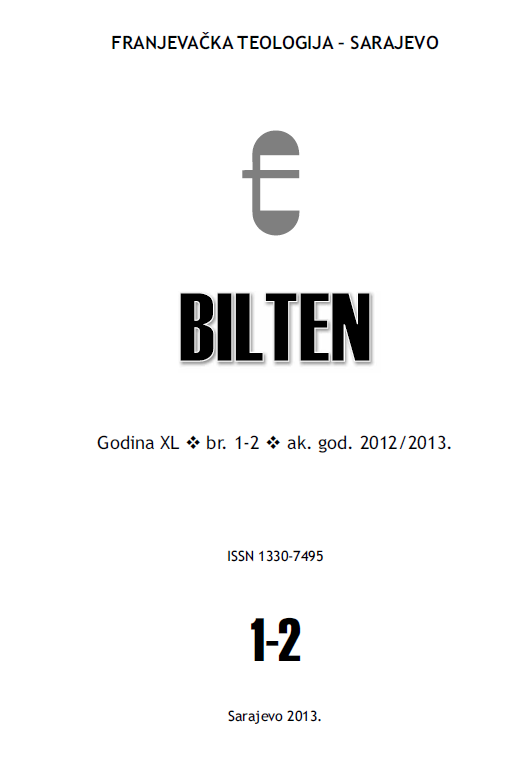
Ove se godine navršava sto godina od rođenja Willyja Brandta, njemačkog kancelara koga svijet najviše pamti po klečanju pred memorijalnim spomenikom žrtvama Varšavskog geta 1970. godine. Taj je čin izazvao veliku pozornost među širim društvenim slojevima te postao primjer i simbol otvorenosti za iskreno pomirenje. No, da bismo ispravno interpretirali ovaj događaj i njegovo društveno značenje moramo ga promatrati u kontekstu Brandtove životne i političke biografije.
More...
Društveno-političku scenu druge polovice prošlog stoljeća posebno je obilježio karizmatični američki predsjednik, kojega se ove godine sjećamo povodom pedesete obljetnice smrti. John Fitzgerald Kennedy rođen je 29. svibnja 1917. godine u izrazito bogatoj i utjecajnoj katoličkoj obitelji porijeklom iz Irske, koja je nakon emigracije uspjela odsanjati američki san. Navedene reference obilježile su cijeli njegov život, pa i smrt.
More...
The article shows and analyzes activities of the Serbian secret organization in eastern Bosnia from 1849 to 1855. It is demonstrated that the goals of the organization by 1851 included the preparation of an uprising against the Turkish rule, but from that point on it served as an intelligence agency with a task to gather information on the circumstances in Bosnia and Herzegovina. The most important features of the organization structure are underlined and certain activities as well as its weaknesses are pointed out. The article is based mostly upon the unpublished archival material of Serbian origin.
More...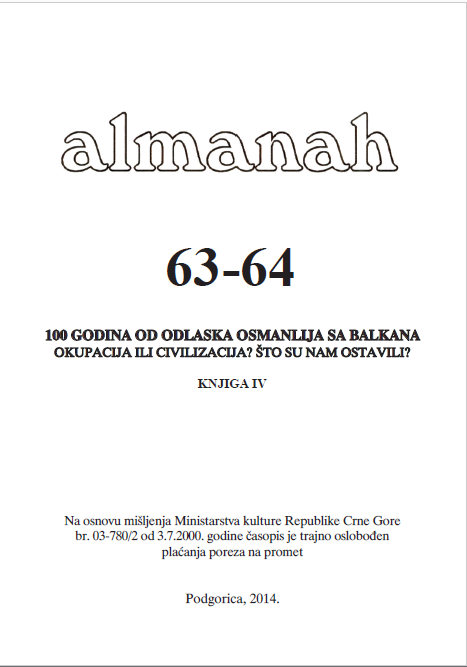
İslam hukukunu temel alan İslam devletlerinde, şeriatın izin verdiği çeşitli alanlarda hukuki düzenlemelere gidildiği bilinmektedir. Tarihte bu tür düzenlemeleri en yaygın biçimde uygulayan devletlerin başında kuşkusuz Osmanlı İmparatorluğu gelmektedir. Özellikle fetih sürecinde ihtiyaçlar doğrultusunda ortaya konan hukuki düzenlemeler, hukukun yeniden üretimi sürecini doğrudan etkilemiştir. Bilindiği üzere Osmanlı fetihlerinin önemli bir bölümü, batı yönünde İslam dışı topraklara doğru olmuştur. Bu toplumların fetih öncesindeki bazı hukuki kuralları, özellikle vergi alanındaki kurallar, fetih sonrasında da yürürlükte kalmıştır. Bu suretle eski Balkan devletlerinin hukuku, kısmen Osmanlı hukukunun içerisine dâhil olmaktaydı. Buradan hareketle Balkan ve Avrupa fetihlerinin Osmanlı hukukunun yeniden üretiminde bir etkiye sahip olduğunu iddia edebiliriz. Bu süreç, bölge ahalisinden bağımsız bir şekilde gerçekleşmemiştir. Bilindiği üzere bazı bölgelerde ahali, vergiye ilişkin kanunname hazırlanma sürecinde rol almıştır. Ahalinin bu sürece dâhil edilmesinde Osmanlı devletinin istimâlet politikasının etkisi büyüktür. Bu çalışmada Balkan fetihlerinin ve bu fetihler çerçevesinde istimâlet politikasının Osmanlı hukukunun yeniden üretimine etkisi, bölge için düzenlenmiş kanunnameler çerçevesinde ortaya konmaya çalışılmıştır.
More...